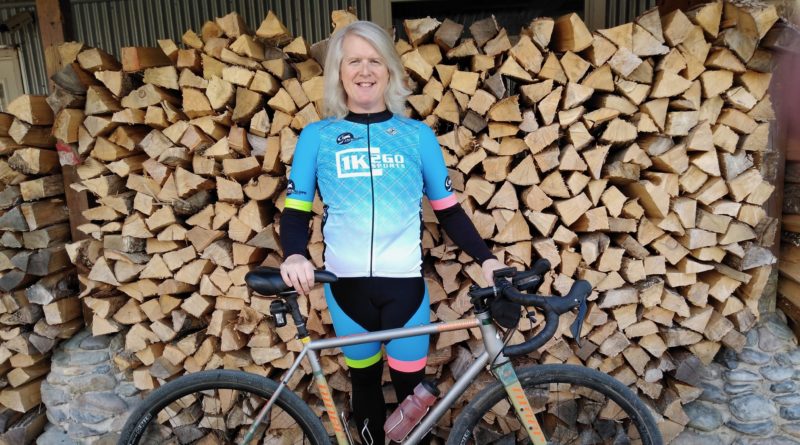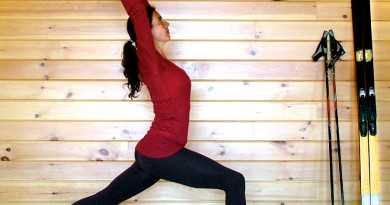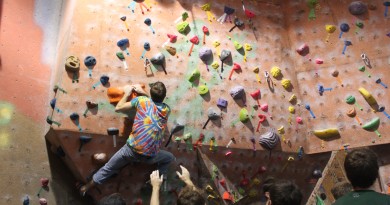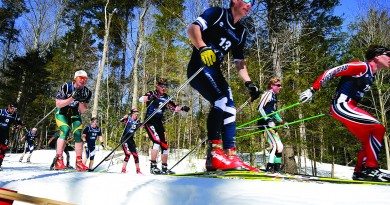The Importance of Being Roxy
In 2018 Roger Bombardier, using a borrowed bike, won gold in his division (men, 50-54) in the 40K road race at the Vermont/Maine Senior Games. It was his first road race, but Bombardier was a veteran mountain bike racer and a long-time bike commuter, who often rode from his home in Richmond to his job in IT at University of Vermont. A year later, in 2019, Bombardier finished ninth in the 48-miler at Rooted, Ted King’s gravel race. This time Bombardier was competing as Roxy, a woman. Over the course of her transition these past two years, Bombardier has shared some of her journey on a private Instagram account where her bio now reads: “Technology Professional, Bicycle Racer, and enthusiast, MTB, Gravel, CX, FAT. Combat Veteran, Goodwill fashionista, woman.”
When did you start entering bike races as a woman?
I’ve been trans since I was 11, so I it’s something I’m used to fighting, and being in the closet about. It was something I only shared with certain people. I presented as a transvestite for a long time and would dress in secret. But I’m of a generation who knew Bruce Jenner as an athlete so seeing him become Caitlyn Jenner, and then seeing [former Vermont gubernatorial candidate] Christine Hallquist transition, that was a real catalyst for me. I started my transition in 2018 and at first very few people knew. But I also wanted to wait until I met all the UCI criteria for testosterone before entering a race as a woman. I have been doing a lot more gravel riding now so it seemed like Rooted, 2019, Ted and Laura King’s gravel race, was a good goal.
How does the UCI define gender?
In March, 2020 UCI began allowing transgender cyclists to compete. You have to prove your serum testosterone level has been below a certain level [5 nmol/L] for at least 12 months prior to a race.
What’s different about racing or riding as a woman versus as a man?
I don’t have the power I used to, and testosterone does play a role but, honestly, that’s about it. When I was identifying as a male and at a point of trying to do well in rides, I was often passed by Elite women and remember getting comfortable with that fairly early on.
How has the cycling community reacted?
My experience has been very positive, probably because of the amateur level that I compete at. And I ride now with a great group of very supportive women. But I’ve followed Rachel McKinnon’s experience—the national master’s champion track cyclist—and she has had a very rough time. She has had her life threatened. She has been doxed and had her public information put out. She’s had to change her name and change careers. She has really suffered greatly for her sport and her discipline. But generally, I think in our community, people are just more interested in enjoying their sport and care less about people’s orientation.
Should we do away with gender at races altogether?
I did have an interesting discussion with an Elite woman mountain bike racer recently. For, example the Catamount Family Center decided to ‘degender’ their results (if that’s even a word) and post results just based on time without regard to a person’s gender or sex. Now, the Elite racer I spoke to was okay with that at the Catamount level but she said that were this to have been a UCI race she would have been unhappy because that would have placed her lower in the overall rankings with less chance of prestige, or prizes. So, I think that some people may view us as a complication. We all have to take a step back and think about gender, sex and what all of that means.
What role do you think genetics play or gender play in performance?
There is a genetic component that we kind of have to acknowledge. But you talk to some people and they say ‘Well, you know a trans somebody who was born a male will have more of an advantage than a cisgender woman.’ I don’t think that that applies so much in endurance sports and I also think it’s terribly unfair. I’ve been in cyclocross races and watched Kim Coleman, Joanne Grogan and many of the others go by me at an incredible rate. And, you know, again, maybe there’s something there genetically or maybe they also discipline themselves a lot when it comes to their diet and training. So, there’s a whole lot to unpack there. But if you’re going to argue it’s not fair for this person to be in a race because they were born say, male, you could also take that to basketball and say well, it’s not really fair that this person happens to be over seven feet tall— that’s a genetic advantage. So, no system is perfect. Then we have a system where UCI looks at testosterone as though testosterone were this magical compound. Maybe it is maybe it isn’t. As I have looked at these Elite women for years, I’ve thought no, no, not so magical.

How do you think about gender in races?
When I get to the tail end of an event, I am utterly exhausted, and I am doing my best to keep myself moving forward. And I’m not sitting there and thinking it’s unfair because [that person ahead of me] they’re six-foot-two with lots of testosterone and could push a lot of watts. I mean, we all know that the world’s best, best endurance athlete could be sitting on a couch somewhere, eating potato chips and smoking Camel Lights, but they haven’t had the opportunity, the encouragement, or the coaching. And let’s not forget that the people who take issue with trans athletes are conveniently forgetting it’s not a genetic lottery, to begin with.
How did you first get into cycling?
I threw my leg over a bike as a little kid growing up here in Vermont, but I don’t think I got serious about it until I got my first mountain bike, back in probably 1992. I was doing things at Catamount in 1993 so I got to see the first wave of mountain biking take off. But then I was away for it for about 10 years during my time in the military.
Can you tell us about your time in the military?
Between 1996 and 2006 I was in the Alpha Company of the 3rd Battalion of the 172nd Infantry Regiment—that’s the Mountain Battalion in the Vermont National Guard. My job was as a military mountaineer and to be prepared for warfare in mountainous terrain. Training included over-snow mobility, some skiing, snowshoeing, you know all the things that encompass infantry but in hostile, cold weather environments and sometimes vertical environments—though I am deathly afraid of heights. And then I did a tour in Iraq.
Did you use those mountaineering skills in Iraq?
I used more basic military skills…managing equipment, planning and preparing for missions. Of course, some of the things that relate to hydration apply across any hostile environment and I managed the heat pretty well. Most of the time I was working on logistics, but I went on about 30 missions. I was shot at and I fired warning shots. I had some rounds pass close to me and had a number of close calls. I managed to come through that without any physical scratches. But after a tour in Iraq, I was done. I just couldn’t do that again. I found it way too difficult and succumbed to a lot of anxiety disorder and PTSD. I had to leave the military. That experience left me with some things that I rely on cycling to help me with.
How has cycling helped you?
Cycling has been my happy place. It’s kept me sane and it’s kept me healthy and it’s probably why I’m here. I like a post-race beer, but I try to manage that because I am vulnerable to substances for a lot of the reasons we just talked about. My wife Sarah of 15 years and I shoot for sleeping from nine to five. So, I manage that, and I try to keep caffeine consumption really low and early in the day. I also manage my diet because I have a tendency to be overweight. I was a fat kid—205 pounds in the eighth grade and a foot and a half shorter than I am now, but I’ve managed to keep my weight around the high 170s. When I came home from the Iraq War, I was 246 pounds. I was very sick; I was in very bad shape and I was having a very rough time. I did work my way back to cycling more intensely and that was part of what helped me get back on track.
What’s your fitness routine now?
I do intervals in intensity Tuesday, I like to do an endurance ride on Wednesday, a tempo-type ride on Friday, a high tempo, but you know an hour or two and then I will do a couple of big rides over the weekend, three- or four-hour rides. I like to do some hill climbing and go up the Bolton Valley access road. I do some core work and lower body lifting Monday, Wednesday and Friday, some upper body work ,some lunges. And every morning I do planks and side planks, and I incorporate your yoga where I can. Then there’s stacking wood, chores around the house chainsaw work, filling my wheelbarrow with wood, you know, things like that.
That’s a pretty intense week.
Thank you. I try and I do dig deep. Very deep. And that’s another thing that I bring my military experience to bear on. I had to push myself very hard to earn the Rams Head Device [a special military badge earned by graduates of the Army Mountain Warfare School in Jericho, Vt.], and be a part of what was a very demanding unit in the Vermont Army National Guard at the time,
And does your wife Sarah work out with you?
Sure, we go on some rides together—we’ve been together since 2004—but she’s much more of a swimmer. She has a huge rack of medals from the Senior Games and other events. Covid-19 has been harder for her since it’s been difficult to get into the pool. I’m eternally grateful to her for her love and support during this challenging time – and to our amazing cycling community too.
And what’s your goal for 2021?
Rooted was my A-race for this past year and my specific goal is to be in the top 10 women in the 82-mile event in 2021. That’s what I’m working toward and it takes place just 3 miles from my home. I may also do the Vermont Overland and the Julbo Eastern Mountain Grind. I’m currently on the 1K2GO team now, Vermont’s cycling team.
But most importantly, I want to be sure that I’m functionally a good athlete, and not just fast on the bike. I want to do more with strength, and other things and have a whole-body approach, because I have a tendency to get too focused on cycling and let other things suffer to a degree. And with transition I’ve got a lot going on right now.





Bolton Valley Access Road hill climbs for the win!